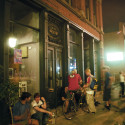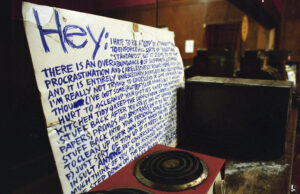
Calling for submissions for the Scene History series!
Are you stoked about the history of your town?  Do you find out interesting nuggets by talking to those who came before you or by scouting out details on Google and Wikipedia? Do you want a reason to hunt out some people you respect and fill in the gaps?
Do you find out interesting nuggets by talking to those who came before you or by scouting out details on Google and Wikipedia? Do you want a reason to hunt out some people you respect and fill in the gaps?
Well, the Scene History series is an opportunity to do just that. Like our Simple History Series, we will publish a new volume each year of the Scene History series that tell the story of a particular city’s scene. (the series does not profile individuals, albums, or bands, and must be framed around a real scene, no fiction!)
Suggested length is 15,000-30,000 words. Get as creative as you find gratifying. Learn about your favorite places and how things developed.
Check out the existing Scene Histories here!
To pitch, just send a general summary of the scene that you are profiling, the years profiled, and your qualifications/interest to profile it! Will it be prose or comics? Do you have access to photos and images? Why are you excited to do this?
Submit or ask questions to joe at microcosmpublishing daht com